Glimpses of Najib's diplomatic touch
2009/07/11
Echoing his economic liberalisation and other innovative domestic initiatives, Prime Minister Datuk Seri Najib Razak’s world view reveals itself to be expansive, opportunity-driven and unflinching of a brave new tomorrow, writes KAMRUL IDRIS
REPORTERs covering Thai Prime Minister Abhisit Vejjajiva's one-day visit to Malaysia last month would have had the feeling that they had seen this movie before.
Apart from a very different cast of characters, the plot was almost exactly the same as Tun Abdullah Ahmad Badawi's trip to Bangkok in February 2007 -- when both countries knocked heads together to find solutions to the troubles in Thailand's southern provinces.
Leadership changes always produce question marks over what went on before, but in his first 100 days in office, Prime Minister Datuk Seri Najib Razak had to provide an excess of reassurance that Malaysia's famous continuity in its kinship with friends and neighbours had not been pushed off a cliff.
Scripts had to be replayed, just to be on the safe side, to compensate for Putrajaya's disappearance from the international and regional stages in the transition to a new government.
After 13 months of an attention deficit in foreign policy since the March 2008 general election, the country's interlocutors were relieved that there was at last someone alive and awake at the wheel.
In the joint press conference between Najib and Susilo Bambang Yudhoyono in Jakarta in May, the Indonesian president was pleased to say that "what we have been doing, we will continue to do to seek agreement on new opportunities to yield concrete results for our two countries".
The Indonesians had elevated Najib's short stay to a full official visit, complete with guard of honour, booming cannonade and big hoardings of the presidential and prime-ministerial couples.
Circumlocution aside, Susilo was glad to know that his closeness to Abdullah would be repeated in a rapport with Najib. Amid territorial disputes, cultural contestations and the running sore of millions of mistreatable migrant workers, a personal bond between their leaders may be the only thing preventing Malaysia-Indonesia ties from falling apart.
As the Jalur Gemilang fluttered in Tiananmen Square a month later, Najib again had to hearten his hosts that the promises made under the Abdullah administration, particularly in respect of the Second Penang Bridge and other commercial dealings, would be kept.
China was the highlight of Najib's itinerary over the 100 days, revealing the new prime minister's diplomatic touch to be deft and sure. He was not just the son following in his father's footsteps, smiling at parades and banquets, and posing for the front page of the China Daily with his family around a rare photograph of Tun Abdul Razak Hussein signing the communique to establish relations 35 years before.
As has become tradition for Malaysian premiers, Najib took up the job of the country's top salesman with gusto. He charmed the business crowds, played on the poignancy of his father's legacy, answered queries and lent a hand in the entrepreneurial networking between the two countries.
In an old civilisation where face, subtlety and nuance matter, Chinese Premier Wen Jiabao did Malaysia the signal honour of holding bilateral talks in the Great Hall of the People -- the gilded scene of Razak's conferences with Zhou Enlai but which was no longer used for such purposes.
Extensively covered at home, Najib's China visit proved that the government was in the driver's seat, able to conduct its external affairs without the distraction of domestic uncertainty.
It did not start well for him, however. Najib's first time out of the country as prime minister was to the aborted Asean Summit in Pattaya, where he along with other heads of government had to leave in a hurry as demonstrators gatecrashed the Thai resort venue.
But the journey was not wasted. He had a few words with Singapore counterpart Lee Hsien Loong to lay the ground for their meeting as part of the prime minister's introductory tour of his Asean comrades in late May.
Like Abdullah, Najib wanted a paradigm shift in relations with Singapore, away from the fixation with one-sided bridges over the straits and non-sales of sand. But unlike Abdullah's golf rounds and durian picnics, Najib was more business-minded, more forward-looking and keener on fresh mechanisms for the sticking points of the past.
The paradigm-shifting was not pursued merely as a better alternative to twiddling thumbs. Najib is worried about the global economic crisis and its blast on Malaysia -- a five per cent contraction in this year's gross domestic product, plummeting foreign investment and exports, rising unemployment.
He softened his hard-nosed pragmatism with the cliche "win-win situation", but the calculation was to save the country from recession by opening its doors wider to business and investment.
To the west, a bigger paradigm waits to be budged. Malaysia's links with the United States had been freighted by politics across eight years of a right-wing Republican regime made a bit crazy by the Sept 11, 2001 terrorist attacks.
It would be foolish petulance to now ignore Barack Obama's outreach across the chasm created by George W. Bush. Najib hit it off in a phone call with America's inaugural black president on June 27 as the first Malaysian leader in a long while to be able to touch base with Uncle Sam without ambivalence.
In the glimpses of it so far, Najib's foreign policy is being shaped less by doctrine and ideology than by work rate and an openness to innovative approaches.
Like his economic liberalisation and other domestic initiatives, the sixth prime minister's world view is revealing itself to be expansive, opportunity-driven and unflinching of a brave new tomorrow.
kamrul@nst.com.my






























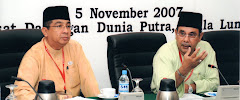


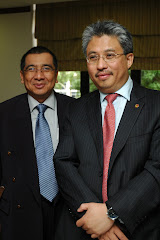
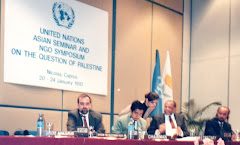
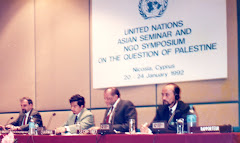
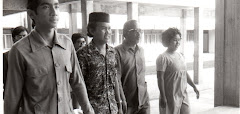
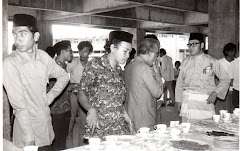
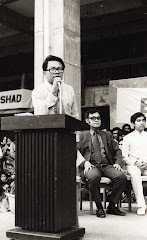


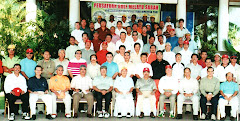





No comments:
Post a Comment